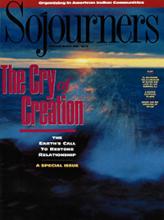"Earthkeeping," a relatively new word in common usage, signals a growing concern for the environment as a major social issue. We do well to linger a bit over the term, to reflect on it carefully.
To keep something is to take care, to be careful; often it means to hold something in trust, to preserve and conserve something precious. In medieval fortified castles, the innermost part -- the place of the final defense, of preservation of all that was most precious -- was called "the keep."
We are being forced to learn that the earth is not ours to exploit at will, that it is not a deposit of raw materials to be worked upon and used up without any consideration of the claims of the earth itself to respect and reverence. The truth that is coming home to us is that we hold the earth itself in trust. Non-human components of our biosphere do have claims on us as elements of a common fabric or system of life. A system is not something added on to the individual parts; rather, the components, including ourselves, exist only as parts of a whole greater than the sum of the parts.
"It is in the shelter of each other that the people live," goes an old Irish saying. This attitude of mutual care must now become a deep value, an organizing principle, or the earth will not be home for many more generations.
Where did humankind go wrong? Certainly the root of the error is found not in political, economic, or social systems and policies but far deeper, in attitudes and beliefs and values that are the underpinnings of all systems and policies. These beliefs and values make up something much more elusive and immeasurable, but all the more powerful. We call it culture.
Read the Full Article

